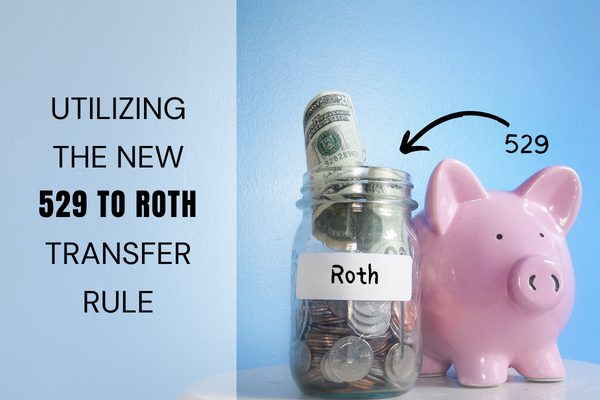529 to ROTH

Market Perspectives April 2024
April 9, 2024
Market Perspectives May 2024
May 6, 2024
By: Audrey Blanke, Lyric Martin, and Bridget McDermott
Introduction:
In the ever-evolving landscape of personal finance, new rules and regulations can often feel like a labyrinth. However, some adaptations stand out as true game-changers, reshaping how individuals plan for their financial futures. One such recent development is the expansion of 529 to Roth IRA conversion rules, presenting a compelling opportunity for savvy investors to optimize their savings strategies. Let’s delve into this intriguing shift and uncover its implications.
Understanding the Basics:
Firstly, let’s break down the fundamentals. The 529 plan, originally designed as a tax-advantaged savings vehicle for education expenses, allows contributors to invest after-tax dollars, with earnings growing tax-free and withdrawals being tax-exempt when used for qualified education expenses. On the other hand, the Roth IRA is renowned for its tax-free growth and withdrawals in retirement, making it a favorite among long-term investors.
The New Frontier:
Traditionally, 529 plans have been restrictive in their usage, primarily earmarked for educational expenses. However, recent legislative changes have loosened these constraints, enabling investors to convert unused 529 plan funds into Roth IRAs for the 529 Plan beneficiary. This expansion transforms a once niche savings tool into a versatile asset in retirement planning.
Key Benefits:
Tax Diversification: By converting 529 funds to a Roth IRA, investors enhance their tax diversification strategy. While 529 plans offer tax-free growth and withdrawals for education expenses, Roth IRAs provide tax-free growth and withdrawals in retirement, offering a broader scope for tax optimization.
Flexibility: The ability to repurpose 529 funds for retirement savings adds a layer of flexibility to financial planning. Individuals can adapt their strategies based on changing priorities, shifting from education-focused savings to bolstering their retirement nest egg.
Estate Planning Advantages: Roth IRAs offer unique estate planning benefits, allowing for tax-free distributions to beneficiaries. By converting 529 funds to a Roth IRA, investors can leverage these advantages to enhance their legacy planning and wealth transfer strategies.
Considerations:
While the expansion of 529 to Roth IRA transfer rules presents a unique opportunity, it’s essential to approach it with careful consideration. Factors such as tax, time horizon and family circumstances should all be weighed before making any decisions. For example, in order to initiate a transfer, the 529 must have been opened for at least fifteen years. Additionally, there is a lifetime maximum of $35,000 that can be transferred into a Roth IRA, subject to annual contribution limits each year. Consulting with a financial advisor can provide personalized insights and guidance tailored to your specific goals.
Conclusion:
The evolution of 529 to Roth IRA conversion rules marks a significant milestone in the realm of personal finance. By bridging the gap between education savings and retirement planning, this regulatory shift empowers individuals to optimize their financial strategies with newfound flexibility and tax efficiency. As with any financial decision, thorough research and thoughtful planning are key to maximizing the benefits and achieving long-term financial security. Embrace the opportunity, but proceed with prudence, and chart a course towards a brighter financial future.
Audrey Blanke, Lyric Martin, and Bridget McDermott are Financial Planners at Carolinas Investment Consulting.
Carolinas Investment Consulting is not affiliated with any of the websites linked in this commentary. Nothing contained herein constitutes financial, legal, tax, or other advice. The views and opinions expressed in this article are those of the author and do not necessarily reflect the official policy or position of Carolinas Investment Consulting. The information published herein is provided for informational purposes only, and does not constitute an offer, solicitation or recommendation to sell or an offer to buy securities, investment products or investment advisory services. All information, views, opinions and estimates are subject to change or correction without notice. The appropriateness of an investment or strategy will depend on an investor’s circumstances and objectives. These opinions may not fit to your financial status, risk and return preferences. Past performance is not indicative of future returns.



